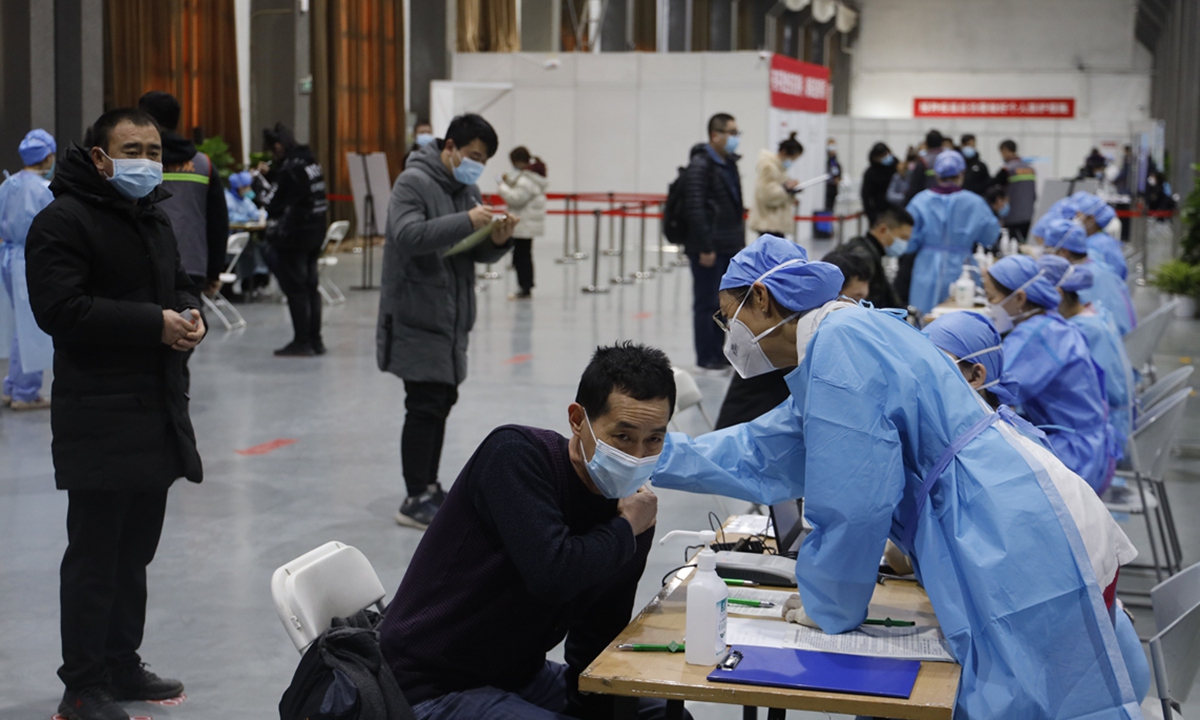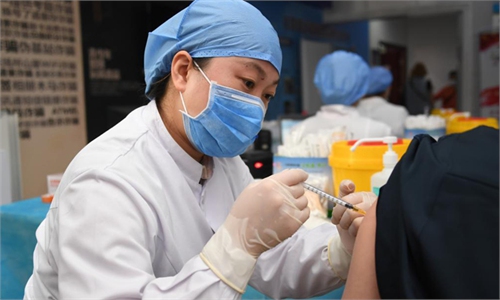
Medical workers check out people's health condition before vaccination at a temporary vaccination site in Chaoyang district, Beijing, on Monday. Photo: Li Hao/GT
China on Friday for the first time released the adverse reactions data for massive inoculation of COVID-19 vaccines, and rates of normal and severe adverse reactions were lower than other common vaccines, which further proved the safety of the vaccines and will boost vaccination willingness worldwide, experts said.
A total of 31,434 adverse reactions were reported among 265 million doses used between December 15, 2020 and April 30, 2021, or 11.86 in every 100,000 doses, the Chinese Center for Disease Control and Prevention announced Friday.
The data was released as China accelerates its vaccination pace. A total of 584 million doses have been administered nationwide, according to China's National Health Commission on Friday, after reporting a record 20 million daily shots on Thursday.
Among adverse reactions, normal reactions like fever and swelling accounted for 82.96 percent while severe reactions such as acute allergies accounted for 17.04 percent. The numbers are lower than the average rates of adverse reactions reported on common vaccines used in 2019.
Among severe adverse reaction cases, 188 were deemed "serious," which means 0.07 cases in every 100,000 doses administered, an occurrence rate of "extremely rare."
Feng Duojia, president of the China Vaccine Industry Association, told the Global Times on Friday that it is the first time for the Chinese health authority to publish the nationwide COVID-19 vaccine adverse reactions data, and the results were "remarkably good."
Feng said that vaccine adverse reactions are normally collected and analyzed by the health department. But since the COVID-19 vaccine is used nationwide for a majority of the population, it's necessary to publish related data to disperse public concerns.
Zhuang Shilihe, a Guangzhou-based immunologist, told the Global Times that the data revealed the rate of serious adverse reactions was lower than that of flu vaccines and significantly lower than that of mRNA COVID-19 vaccines.
Mexican health authorities reported 13,958 adverse reactions among 8.65 million BioNTech-Pfizer vaccines (mRNA) and 1,571 cases for Chinese vaccines from Sinovac (1,368) and CanSino (203) among 7.7 million doses combined. Proportions of the two Chinese vaccines in the 7.7 million doses were not given.
Zhuang also mentioned whether data was collected in full will affect accuracy of the numbers.
There is a possibility of untimely and incomplete reports of adverse reactions when the vaccines were administered massively in a short period of time given the urgency of the epidemic threats, experts said.
People may also have very different feelings even though their physical reactions were similar, they said.
A Beijing resident surnamed Bai told the Global Times that she got a fever of 39.5 C after receiving a dose of vaccine in February but did not report the situation. Bai said she did not know she could report it to the vaccination center or health authorities. The phenomenon (of fever) is not rare for vaccination and there is no need to worry, Bai said.
The entire world has started massive inoculations in hopes of curbing the pandemic and resuming connections, safety concerns remain. On Wednesday, Japan reported 57 more deaths, bringing total to 85 among 8.6 million Pfizer doses, and the main reasons were heart attacks and strokes. But Japanese authorities noted they cannot determine the connections between vaccination and deaths.
AstraZeneca shots had also been braced with reluctance after reporting blood clots among receivers. Many countries had temporarily suspended the use but resumed later amid the more urgent epidemic control situation.
Feng noted the publication of the adverse reactions data not only boosted Chinese people's confidence in Chinese vaccines, but also helped enhance other countries' trust in the doses and vaccination willingness.
Thailand on Friday granted emergency use to China's Sinopharm vaccines. The country had previously greenlighted China's Sinovac doses, as well as BioNTech-Pfizer, Moderna, AstraZeneca and Johnson & Johnson vaccines.
China has been transparent and open on the doses, Feng said, and he believes vaccine developers will continue to collect data on adverse events and Chinese health authorities will regularly publish data on the use of vaccines.



